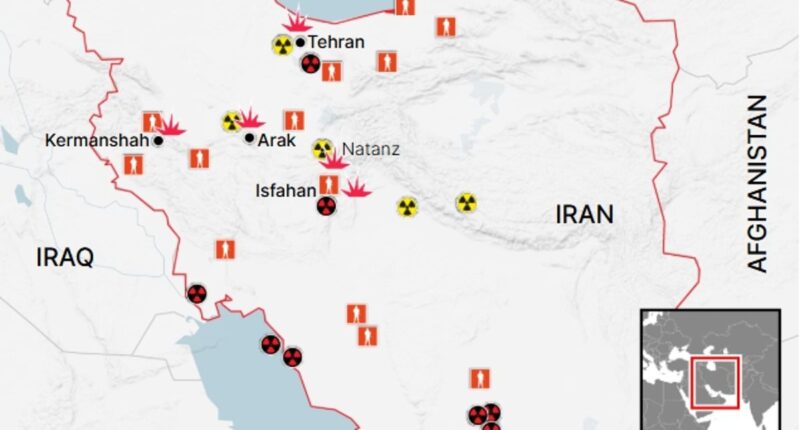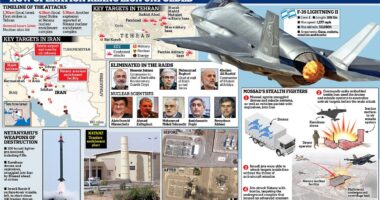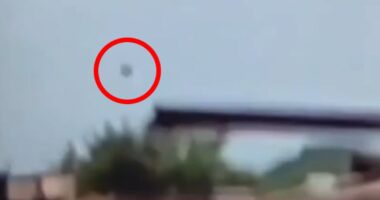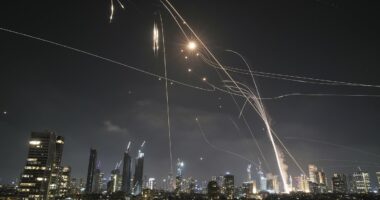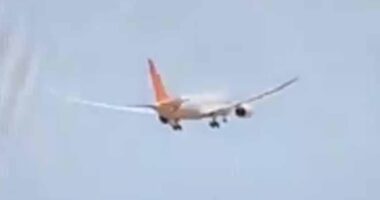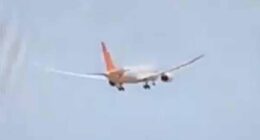
Israel has initiated an extraordinary attack on Iran, utilizing fighter jets and a secret drone base near Tehran to strike nuclear facilities, missile launch sites, and neutralize military command. This bold move has pushed the region to the brink of full-scale conflict.
Named Operation Rising Lion by Prime Minister Benjamin Netanyahu, this offensive is the result of meticulous planning by Israel’s military and Mossad intelligence agency to prevent Iran from acquiring nuclear arms.
It also constitutes the greatest threat Iran has faced since its full-scale 1980s war with Iraq.
The operation kick-started with the deployment of attack drones from a hidden Mossad base on Iranian territory to dismantle Tehran’s surface-to-air and ballistic missile systems.
This daring covert mission, illustrated by incredible footage of the unmanned craft honing in on missile launchers, crippled Iran’s air defences and allowed Israel’s war planes to launch their attacks with impunity.
Netanyahu styled the shocking attacks as a ‘pre-emptive strike’ on Iran’s fledgling nuclear programme, warning that intelligence suggested Tehran was ‘approaching the point of no return’ in its decades-long pursuit of a nuclear deterrence.
But the operation not only targeted dozens of military and nuclear installations, including Iran’s prized Natanz Fuel Enrichment Plant (NEP) – it also eliminated the upper echelon of the Islamic Republic’s military command structure.
Armed Forces Chief of Staff Mohammad Bagheri, Commander of the Revolutionary Guards (IRGC), Hossein Salami, IRGC Aerospace Forces commander Amir Ali Hajizadeh and Commander of Khatem al-Anbiya (Emergency Command), Khatem-Gulam Ali Rashid were all confirmed dead along with several other high-ranking figures.
A host of Iran’s leading nuclear scientists including Dr. Mohammad Mehdi Tehranchi, project supervisor of the Islamic Republic’s Amad plan to test nuclear weapons, and Fereydoon Abbasi, the former head of Iran’s Atomic Energy Organisation, also perished in the attacks.
Tehran this morning announced Israel’s actions amounted to a ‘declaration of war’ and told the UN it would respond ‘decisively and proportionately’. It also called for the United Nations Security Council to convene an emergency meeting, which is set to take place later today.
Analysts warned Israel’s attacks, which dealt a ‘tactical loss and a profound strategic humiliation to Tehran’, went far beyond the level necessary to cripple Iran’s nuclear programme.
Around 200 US-made fighter jets were used in the attacks, dropping hundreds of munitions on more than 100 targets in an operation one expert said could be seen as an attempt to ‘destabilise the regime’.
But Israeli officials have vowed the operation will continue for ‘as long as it takes’ to achieve their desired aims, raising the prospect of a full-scale war should Iran be forced to respond to further offensives.
Iran’s Supreme Leader Ayatollah Ali Khamenei immediately vowed retribution, declaring that Israel would be met with a ‘severe punishment’, adding it had ‘opened its wicked and blood-stained hand to a crime in our beloved country, revealing its malicious nature more than ever by striking residential centres’.
Around 100 Iranian drones were spotted soaring over Iraq toward Israel early this morning, but almost all projectiles were intercepted by Israeli and Jordanian air defence systems outside of Israeli territory.
This limited response is likely just the first phase in a longer and more coordinated approach from the Islamic Republic.
Lebanon’s Hezbollah – long seen as the jewel in the crown of Iran’s so-called ‘Axis of Resistance’ of proxy forces – warned Friday that Israel’s strikes ‘threaten to ignite the region’ but said it had no immediate plans to retaliate.
That Hezbollah appears unwilling to fight back on Iran’s behalf suggests that its capabilities have been heavily degraded by Israel’s military operations on Iranian proxy forces following Hamas October 7, 2023 attacks.
Explosions rang out across Iran from around 3am local time as Israel said it sent some 200 warplanes to deliver their munitions. Attacks were reported at sites across Tehran as well as in cities and provinces known to host key nuclear facilities and military installations, including Isfahan – the location of the Natanz FEP – Tabriz, Kermanshah, Arak and Shiraz.
‘The underground area of the (Natanz) site was damaged. This area contains a multi-storey enrichment hall with centrifuges, electrical rooms and additional supporting infrastructure,’ the Israeli military said in a statement.
‘In addition, critical infrastructure enabling the site’s continuous operation and the Iranian regime’s ongoing efforts to obtain nuclear weapons were targeted,’ it added. Tehran later confirmed nuclear facilities in Khondab and Khorramabad had also suffered strikes.
Meanwhile, scores of top Iranian military figures were killed along with several of the Islamic Republic’s leading nuclear scientists.
Among the most significant deaths were those of General Mohammed Bagheri and Hossein Salami.
Bagheri was the highest-ranking officer in the Iranian armed forces and was responsible for overseeing the army, the Revolutionary Guards and Corps and the country’s ballistic missile programme. In office since 2016, Bagheri worked directly under the authority of Ayatollah Ali Khamenei – Iran’s ultimate decision maker and the commander-in-chief of its armed forces.
Salami, the chief of the IRGC, was a 45-year veteran of the corps and had led the outfit since 2019.
The assassinations only intensify an already perilous security climate in the Middle East amid Israel’s ongoing war in Gaza, the recent fall of Syria’s President Bashar al-Assad and ongoing attacks by Yemen’s Houthi rebels.
Early this morning, Israel’s military signalled it had completed its operation, but Israeli Defence Minister Israel Katz quickly declared it would ‘continue its activities to thwart the Iranian nuclear program and remove threats on the State of Israel’, suggesting that subsequent strikes could be in the offing.
‘The precise hit on the heads of the commanders of the Revolutionary Guards, the Iranian army and the nuclear scientists, who were all involved in promoting the plan to destroy Israel, is a strong and clear message – those who work to destroy Israel will be eliminated,’ he said.
More explosions have since been reported at locations across Iran, including in the northwestern province of East Azerbaijan.
Netanyahu expressed hope the attacks would trigger the downfall of Iran’s theocracy, saying his message to the Iranian people was that the fight was not with them, but with the ‘brutal dictatorship that has oppressed you for 46 years.’
‘I believe that the day of your liberation is near,’ he said.
Matthew Savill, Director of Military Sciences at the Royal United Services Institute (RUSI) think tank, said the scale of the attacks by Israel was unprecedented.
‘The breadth and scale of these strikes – against senior Iranian officials in addition to nuclear sites – suggest this operation is intended to not just dissuade Iran from pursuing nuclear weapons, but also cripple any potential military response and even to destabilise the regime.
‘Targeting of the commander of the IRGC, the head of the conventional military and top advisers are all beyond what is necessary for a purely pre-emptive strike on the nuclear programme.
‘Israel has once again demonstrated its considerable conventional military superiority, and the size of the force allegedly assembled for this series of attacks represents the overwhelming bulk of its longer-range strike aircraft.’
Israel’s stunning offensive came just hours after US President Donald Trump urged Netanyahu not to interfere with Iran.
The Trump administration was engaged in negotiations to steer Tehran away from nuclear weapons development in exchange for the lifting of economic sanctions, but talks had seemingly hit a stalemate.
Earlier this week the US was forced to evacuate staff from its embassy in Iraq amid rumblings that Israel was considering an attack on the country’s neighbour.
When asked at the White House yesterday about the possibility of an Israeli strike on Iran, Trump warned an attack at this stage of negotiations could cause a ‘massive conflict’.
‘It’s very simple – not complicated. Iran cannot have a nuclear weapon. Other than that, I want them to be successful. We’ll help them be successful. We’ll trade with them, we’ll do whatever’s necessary,’ he said.
‘I want to have an agreement with Iran. We’re fairly close. As long as there is an agreement, I don’t want [Israel] going in because I think that would blow it.
‘There’s a chance of massive conflict. We have a lot of American people in this area, and I said: ‘We’ve gotta tell them to get out because something could happen soon, and I don’t want to be the one who didn’t give them any warning.’
Washington sought to distance itself from the attacks this morning, with US Secretary of State Marco Rubio insisting that Israel had taken ‘unilateral’ action against Iran.
‘We are not involved in strikes against Iran and our top priority is protecting American forces in the region,’ he said in a statement. ‘Let me be clear: Iran should not target US interests or personnel.’
But analysts said it was unlikely that Israel would have conducted attacks of this magnitude without consulting Washington, while Netanyahu delivered a speech that sought to paint Israel and the US as twin targets of Khamenei’s regime.
‘Remember, Iran calls Israel the Small Satan. It calls America the Great Satan. This is why for decades, it’s led millions in the chant ‘Death to Israel and death to America’, Netanyahu drawled.
‘Today, Israel is responding to those genocidal calls with action and a call of our own: Long live Israel and long live America! Our action will help make the world a much safer place’.
He added: ‘I want to thank President Trump for his leadership in confronting Iran’s nuclear weapons programme.’
Trump later declared in a post on his Truth Social platform that ‘the next already planned attacks’ would be ‘even more brutal’ and urged Iran to make a deal ‘before there is nothing left’.
‘I gave Iran chance after chance to make a deal… No matter how close they got, they just couldn’t get it done. I told them it would be much worse than anything they know, anticipated, or were told.’
Trump added in separate comments that the United States will defend itself, and Israel, if Iran retaliates. He is also set to hold a meeting with the National Security Council later this morning.
RUSI’s Matthew Savill told MailOnline Iran could seek to retaliate against US targets as well as Israeli ones.
‘The Iranian response might be delayed or split into multiple phases, but their main weapon will be ballistic missiles, which have the best chance of inflicting damage on Israel, whereas drone and cruise missile attacks will face more extensive Israeli defences.
‘Offensive cyber capabilities and terrorist attacks remain an option, but Iran’s proxies are much diminished in the region.
‘If Iran believes the US or others were involved, then regional targets include the US Fifth Fleet in Bahrain, and air facilities in Qatar, though both would widen the conflict to drag in others.’
The full list of targets struck by Israel is yet to be confirmed, but a slew of nuclear facilities, military bases, airports and missile launch complexes have been destroyed or damaged, along with a significant portion of Tehran’s air defence assets.
Iran’s known enrichment and centrifuge production facilities are mostly kept underground away from prying eyes.
Natanz FEP, one of Iran’s prized nuclear facilities, is located in Isfahan province south of Tehran.
Iran had previously cited the ‘possibility’ of an air attack from Israel in its decision to shelter the site with some 22 metres of earth, on top of 12 metres of reinforced concrete.
But Israel’s bunker-busting bombs appeared to have penetrated these defences.
Iran admitted that Israel’s operation had ‘damaged several parts of the facility’, though it declined to give further information.
Satellite images that emerged this morning appeared to show a trail of black smoke emanating from the facility.
The UN’s nuclear watchdog (IAEA) confirmed Natanz had been hit but said there appeared to be no sign of radioactive or chemical contamination.
It appears that Israel chose not to target Fordow – Iran’s second major enrichment plant after Natanz – which is believed to have been constructed even deeper underground at some 80-90 metres.
Iran has long maintained that its nuclear programme is entirely peaceful, but Israeli and US analysts said that the secrecy surrounding Fordow’s operations, and its proximity to a military base, suggest it could be used to produce weapons-grade uranium.
In October last year, the Air Force attacked a military facility at Parchin (about 30km southeast of Tehran), which is reportedly linked to the Khojir missile production complex.
Israel confirmed today that the Parchin facility was targeted again in this morning’s strikes, along with a military airbase in Tabriz.
The Bakhtaran Missile Base in Kermanshah, a site the Nuclear Threat Initiative (NTI) global security organisation assesses to be a ‘potential launching point for ballistic missiles against Israel, the Gulf States and Europe’, is likely to have been targeted.
The base houses an underground facility, two munitions storage areas, and missile launch pads.
Other likely targets include the Imam Ali missile base further south, which houses underground silos believed to be capable of launching Shahab-3 missiles.
That missile has a range of about 1,250 miles, which could put Israel and US bases in the Gulf within reach, according to officials in Tehran.
Further south still, a missile production facility in Shiraz is believed to be used to produce fuel and components for Shahab-1/Scud-B missiles, and to conduct research and development.
Production facilities might not pose as immediate a threat as operational military bases, but are desirable targets for an air force looking to cripple functionality.
International Affairs lecturer at University of St. Gallen and expert on Middle Eastern politics Dr. Andreas Böhm told MailOnline: ‘Israel’s fresh strike on Iran has exposed just how fragile Tehran’s regional influence has become.
‘When Yahya Sinwar gave the order to attack on the morning of October 7, 2023, his goal was to ignite a regional upheaval. In a way, he succeeded – but with consequences entirely opposite to what he intended. Hamas is finished, the so-called ‘axis of resistance’ lies in ruins, and Iran is weaker than at any point since the revolution.
‘The Israeli strikes have ruthlessly exposed the vulnerabilities of the Iranian regime. Years of systematic infiltration by Israeli intelligence have exposed its inner workings. Mossad even operated freely on Iranian soil.’
Dr Burcu Ozcelik, Senior Research Fellow for Middle East Security at RUSI, said: ‘For Tehran, this is not only a tactical loss but a profound strategic humiliation. The decapitation of senior command is expected to disrupt Iran’s decision-making architecture at a critical moment, complicating any coordinated retaliatory response.
‘What comes next may define the regional security order for years to come and the risk of regional escalation remains high.’
World leaders urgently called for restraint amid fears Israel’s operation could trigger a regional war, while Iran’s neighbour Iraq filed a complaint with the United Nations Security Council, alleging Israel violated its airspace to conduct the strikes.
‘These practices constitute a flagrant violation of Iraq’s sovereignty,’ the ministry said, calling on ‘the Security Council to assume its responsibilities’ and act to ‘prevent the recurrence of such violations’.
British Prime Minister Sir Keir Starmer said the British Government urged ‘all parties to step back and reduce tensions urgently’ after Israeli strikes on Iran, adding that ‘now is the time for restraint, calm and a return to diplomacy’.
Starmer has said stability in the Middle East ‘must be the priority’. Reports have suggested Britain will not protect Israel in the event of an Iranian retaliation, having recently sanctioned key Israeli officials and scaled back arms exports over the war in Gaza.
Sir Keir’s sentiments were echoed by Foreign Secretary David Lammy, who said stability in the Middle East was ‘vital’ for global security.
‘Further escalation is a serious threat to peace & stability in the region and in no-one’s interest,’ he said in a post on X.
‘This is a dangerous moment & I urge all parties to show restraint.’
Regional states roundly condemned Israel’s actions.
Turkish President Recep Tayyip Erdogan warned Israel was seeking to drag the world into ‘disaster.
‘The international community must put an end to Israeli banditry that targets global and regional stability,’ he said.
Jordan’s state media says the country’s foreign minister has discussed Israel’s strikes on Iran with his Egyptian counterpart, and warned that the attack pushes the region into more tension and conflict.
Jordan News Agency said the ministers called the strikes a ‘dangerous escalation and a flagrant violation of international law.’
Egypt and Jordan are among Arab countries that signed peace treaties with Israel and have normal relations with it.
Qatar’s Prime Minister declared that Israel’s ‘absurd actions’ continue to ‘destroy prospects for peace’ and put global security in ‘imminent danger’, while Saudi Arabia’s Foreign Ministry said: ‘The Kingdom of Saudi Arabia expresses its strong condemnation and denunciation of the blatant Israeli aggressions… which constitute a clear violation of international laws and norms.’
Meanwhile, Europe’s leading powers appeared divided.
France urged restraint on all sides, with foreign minister Jean-Noel Barrot writing on X: ‘We call on all sides to exercise restraint and avoid any escalation that could undermine regional stability’.
French President Emmanuel Macron has been among Netanyahu’s harshest critics in recent months and declared the blockade of Gaza by the Israeli a ‘disgrace’.
He is also said to be considering an open endorsement of recognition of an independent Palestinian state at a UN conference next week, a move that would enrage Israel.
But Chancellor Friedrich Merz said he was informed about the attack by Benjamin Netanyahu and said in a statement that Israel has a right to defend itself and Iran should not develop nuclear weapons.
He later added that neither side should seek escalation.
European Commission President Ursula von der Leyen said on X: ‘The reports emerging from the Middle East are deeply alarming.
‘Europe urges all parties to exercise maximum restraint, de-escalate immediately and refrain from retaliation. A diplomatic resolution is now more urgent than ever.’
EU foreign policy chief Kaja Kallas said in a statement that ‘diplomacy remains the best path forward, and I stand ready to support any diplomatic efforts toward de-escalation.’
China said it is ready to play a ‘constructive role’ in easing tensions between Israel and Iran, but Chinese foreign ministry spokesman Lin Jian said Beijing was against what it described as ‘violations of Iran’s sovereignty, security, and territorial integrity’.
